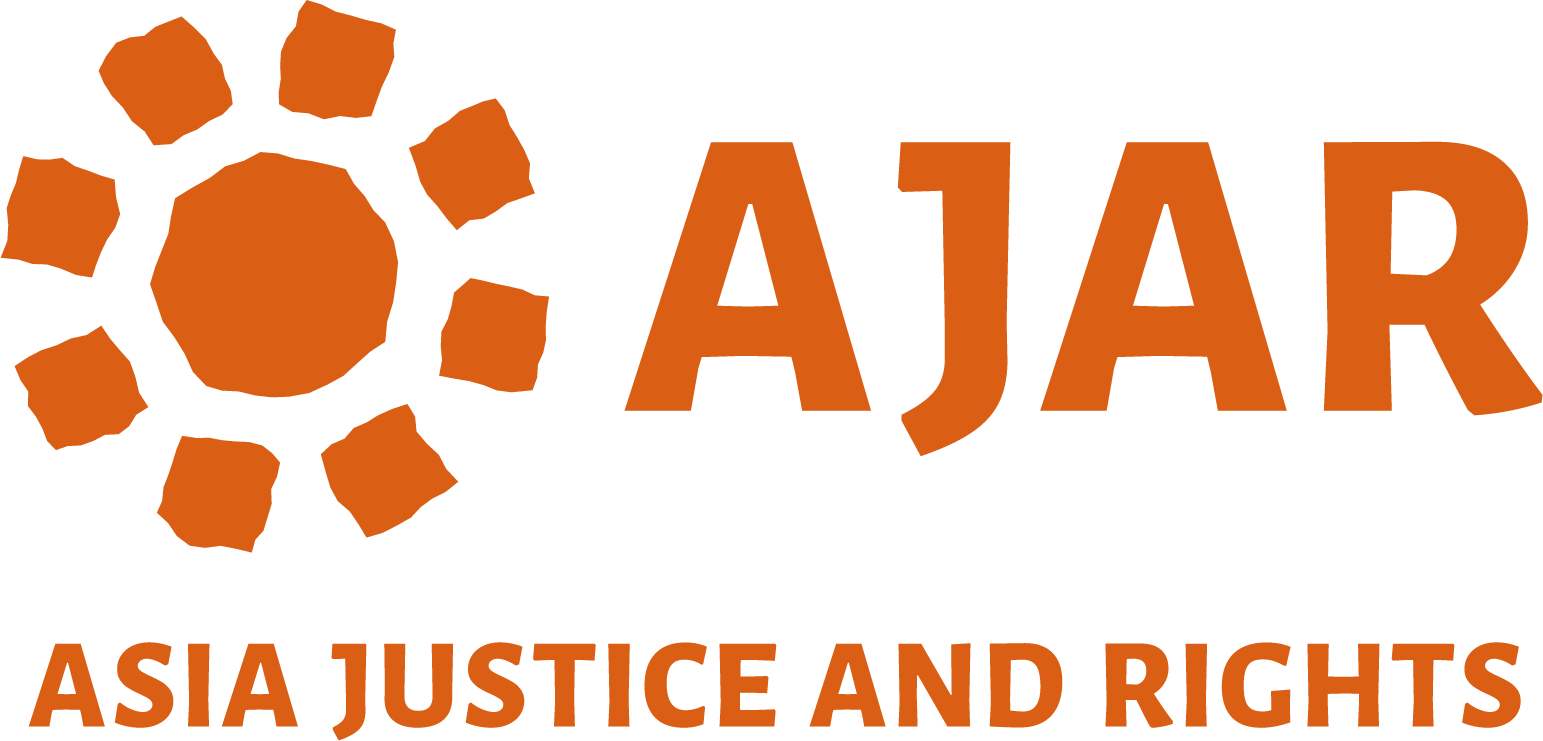National courts make up a state’s domestic judicial system. Many view national courts as the preferred forum for the prosecution of past human rights violations because they demonstrate a country’s effectiveness in applying the law within its own judicial and cultural context.
Holding a trial in the country where violations occurred may prove easier and more efficient than holding it in international or hybrid courts.
ပြည်တွင်းတရားရုံးများကို နိုင်ငံတစ်ခု၏ ပြည်တွင်းတရားစီရင်ရေးစနစ်ဖြင့် ဖွဲ့စည်းထားပါသည်။ အတိတ်က လူ့အခွင့်အရေးချိုးဖောက်မှုများအား တရားစွဲဆိုရန်အတွက် ပြည်တွင်းတရားရုံးများကို ပိုမိုသင့်တော်သော နေရာအဖြစ် လူအများက ရှုမြင်ကြသည်။ အဘယ်ကြောင့်ဆိုသော် ပြည်တွင်း တရားစီရင်ရေးနှင့် ယဉ်ကျေးမှုဆိုင်ရာ အခြေအနေအတွင်း နိုင်ငံတော်၏ ဥပဒေကိုထိရောက်စွာ ကျင့်သုံးနိုင်မှုကို ပြည်တွင်းတရားရုံးများက ပြသသောကြောင့် ဖြစ်သည်။ ဥပဒေချိုးဖောက်မှုများ ဖြစ်ပွားခဲ့သည့် နိုင်ငံ၌ ရုံးတင်စစ်ဆေးခြင်းသည် အပြည်ပြည်ဆိုင်ရာ သို့မဟုတ် ပူးတွဲတရားရုံးများတွင် စစ်ဆေးခြင်းထက် ပိုမိုလွယ်ကူပြီး ထိရောက်အကျိုးဖြစ်ထွန်းကြောင်း သက်သေပြနိုင်သည်။
Examples of national or domestic courts to prosecute serious crimes include:
ဆိုးရွားပြင်းထန်သောရာဇဝတ်မှုများကို တရားစွဲဆိုခဲ့သော ပြည်တွင်းတရားရုံးများ၏ သာဓကများတွင် အောက်ပါတို့ပါဝင်သည်။
Indonesia: Between September 2003 – August 2004, fourteen active and retired military officials were tried by an ad hoc domestic court for serious crimes in Tanjung Priok. Two were convicted, but later acquitted on appeal.
အင်ဒိုနီးရှား – စက်တင်ဘာ ၂၀၀၃ မှ ဩဂုတ် ၂၀၀၄ ခုနှစ် ကြားကာလအတွင်း Tanjung Priok တွင် ဆိုးရွားပြင်းထန်သော ရာဇဝတ်မှုများကို ကျူးလွန်မှုဖြင့် လက်ရှိကာလတွင် အငြိမ်းစားယူထားပြီးသောသူများနှင့် တာဝန်ထမ်းဆောင်နေဆဲ စစ်တပ်အရာရှိ ၁၄ ဦးကို ပြည်တွင်းအထူးခုံရုံးတွင် တရားစွဲဆိုခဲ့သည်။
Argentina: In 2006, members of the 1970s military junta were put on trial. By mid-2010, 1,464 people had been indicted for crimes against humanity and 74 had been convicted. Former General Reinaldo Benito and five other military officers were convicted and sentenced to 25 years for kidnappings and torture committed from 1976 to 1978. Former head of the military junta, Jorge Videla was also put on trial with over 20 other junta members for killing more than 30 political prisoners in 1976. In 2012, Videla and Bignone were convicted to 50 and 15 years in prison respectively for overseeing kidnappings of babies from 1976 to 1983.
အာဂျင်တီးနား – ၁၉၇၀ ခုနှစ်များ ကာလအတွင်းက စစ်အာဏာရှင်အဖွဲ့ဝင်များအား ၂၀၀၆ ခုနှစ်တွင် တရားခုံရုံးရှေ့မှောက်သို့ ပို့ဆောင်ခဲ့သည်။ ၂၀၁၀ ခုနှစ် နှစ်လယ်ပိုင်းတွင် လူပေါင်း ၁၄၆၄ ဦးကို လူသားမျိုးနွယ်အပေါ် ကျူးလွန်သော ရာဇ၀တ်မှုများဖြင့် စွဲချက်တင်ခဲ့ပြီး ၇၄ ဦးကို ပြစ်ဒဏ်ချမှတ်ခဲ့သည်။ ၁၉၇၆ မှ ၁၉၇၈ ခုနှစ်အကြား ပြန်ပေးဆွဲမှုများနှင့် ညှဉ်းပန်းနှိပ်စက်မှုများ ကျူးလွန်ခဲ့ကြောင်း ပြစ်မှုထင်ရှားသည့် ဗိုလ်ချုပ်ဟောင်း Reinaldo Benito နှင့် အခြားစစ်ဘက်အရာရှိ ၅ ဦးကို ထောင်ဒဏ် ၂၅ နှစ်စီ ချမှတ်ခဲ့သည်။ ၁၉၇၆ ခုနှစ်တွင် နိုင်ငံရေးအကျဉ်းသား ဦးရေ ၃၀ ကျော်ကို သတ်ဖြတ်မှုဖြင့် စစ်အာဏာရှင်ဟောင်း ဂျော့ဂ်ျဗီဒဲလား (Jorge Videla) အား အခြားစစ်အာဏာရှင် အဖွဲ့ဝင် ၂၀ ကျော်နှင့်အတူ ရုံးတင်စစ်ဆေးခဲ့သည်။ ၁၉၇၆ ခုနှစ်မှ ၁၉၈၃ ခုနှစ်အထိ ကလေးငယ်များအား ပြန်ပေးဆွဲမှုအား ကြီးကြပ်ဆောင်ရွက်ခဲ့သည့်အတွက် Videla နှင့် Bignone တို့အား ၂၀၁၂ ခုနှစ်တွင် ထောင်ဒဏ် ၅၀ နှင့် ၁၅ နှစ်စီ အသီးသီး ချမှတ်ခဲ့သည်။
Bangladesh: The International Crimes Tribunal (ICT) was established in 2009 as a domestic war crimes tribunal with a mandate to investigate and prosecute perpetrators of the 1971 genocide. The suspects were members of the Pakistani military and their local collaborators.
ဘင်္ဂလားဒေ့ရှ် – ၂၀၀၉ ခုနှစ်တွင် နိုင်ငံတကာရာဇဝတ်ခုံရုံး (ICT) ကို ပြည်တွင်းစစ်ရာဇဝတ်မှုခုံရုံးအဖြစ် ဖွဲ့စည်းတည်ထောင်ခဲ့ပြီး ၁၉၇၁ ခုနှစ်တွင် ဖြစ်ပွားခဲ့သည့် လူမျိုးသုဉ်းသတ်ဖြတ်မှုကို ကျူးလွန်သူများအား စုံစမ်းစစ်ဆေးရန်နှင့် တရားစွဲဆိုရန် အခွင့်အာဏာပေးအပ်ခဲ့သည်။
Guatemala: In 2013, attempts were made to convict former military leader Efraín Ríos Montt is convicted of genocide and crimes against humanity. Ten days later, however, the Constitutional Court overturned the conviction and ordered a retrial.
ဂွါတီမာလာ- စစ်ခေါင်းဆောင်ဟောင်း Efraín Ríos Montt အား လူမျိုးတုံးသတ်ဖြတ်မှုနှင့် လူသားမျိုးနွယ်အပေါ် ကျူးလွန်သည့် ရာဇ၀တ်မှုများဖြင့် ပြစ်ဒဏ်ချမှတ်ရန် ၂၀၁၃ ခုနှစ်တွင် ကြိုးပမ်းပြီး ပြစ်ဒဏ်ချမှတ်နိုင်ခဲ့သည်။ သို့သော် ဆယ်ရက်ကြာပြီးနောက်တွင် ဖွဲ့စည်းပုံအခြေခံဥပဒေခုံရုံးက ပြစ်ဒဏ်ကို ပယ်ဖျက်ခဲ့ပြီး ပြန်လည်စစ်ဆေးရန် အမိန့်ပေးခဲ့သည်။
